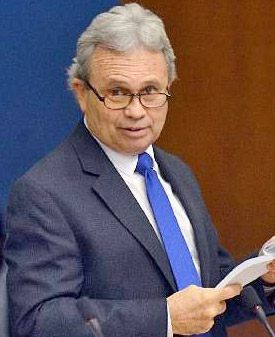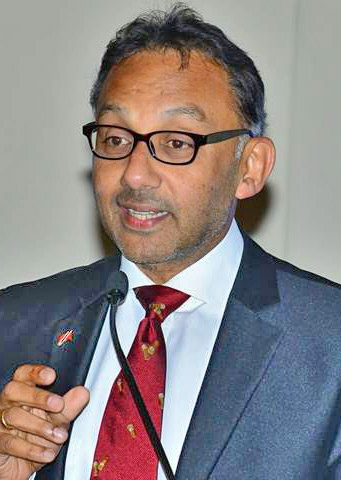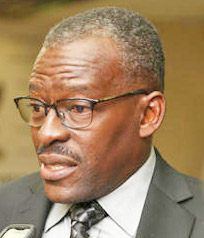Trinidad & Tobago
Govt – Petrotrin in $4.2b debt

Port-of-Spain – For Finance Minister Colm Imbert to claim State-owned oil company Petrotrin has accumulated a (TT) $4.2 billion loss displays a “lack of appropriate experience and qualification”, former Trade Minister Vasant Bharath said last week.
Last week Imbert said between the years 2011-2016, Petrotrin had sustained $4.2 billion in losses. He claimed this would now have to be shown in Petrotrin’s books as a “loss”, rather than as a “deferred tax asset.”
Bharath said Imbert’s statement displayed “both his lack of appropriate experience and qualification for this pivotal and crucial portfolio as well as his indiscretion in pointing fingers at an internationally reputable accounting firm, from whose glare and scrutiny these losses were supposedly concealed”. Bharath is a former minister in the Ministry of Finance. He added: “The truth of the matter, as the minister would have been informed, is that Petrotrin would have brought forward unused capital allowances, accumulated as a result of refinery upgrades as well as the failed WGTL project which cost taxpayers $3.3 billion and a further $3.2 billion in relation to a separate project involving an ultra-low sulphur diesel (USD) plant constructed by South Korean firm Samsung Engineering and Construction Limited.”
Bharath said both projects had been entered into under the Malcolm Jones-led board in 2009.
“Provided the auditors are given sufficient evidence that the company will make sufficient profits in the future, these allowances remain on the company’s books as a deferred asset,” he said. He noted that a deferred tax asset was an accounting term which referred to a situation where a business has overpaid taxes or taxes paid in advance on its balance sheet.
These taxes were eventually returned to the business in the form of tax relief. Therefore, the over-payment was an asset for the company, Bharath argued.
He noted: “It is clear that as a result of no such assurances being given to the auditors, they may have had little choice but to write off the asset as being ‘unrelievable’ against future profits. This is what has given rise to the alleged loss of $4.2 billion on Petrotrin’s books. It has absolutely nothing to do with the management of Petrotrin under the People’s Partnership government and everything to do with the incompetence and mismanagement of the present regime.”
Bharath’s statements were made following Imbert’s revelation that an undisclosed $4.2 billion deferred tax asset, which was not shown in Petrotrin’s accounts, could result in the State oil company recording audited losses to the tune of $4.5 billion in 2016, rather than the previously disclosed estimate of $600 million.
Imbert added that on October 26, 2016, Petrotrin reported a net loss after tax of $533 million in its unaudited financials for the year ending September 30, 2016. Prior to this the company declared a total comprehensive loss of $998 million for 2015 and a total comprehensive loss of $341 million for 2014.

He added: “It has recently come to the government’s attention that Petrotrin’s refinery operation has been unprofitable for the last five years, from 2011 to 2016, a matter that was not revealed before.”
Imbert said rather than declaring these losses, Petrotrin has been carrying them “as a deferred tax asset to be written off against future profits.”
Noting a deferred tax asset is treated as an asset on the company’s balance sheet rather than as a liability, Imbert stated it is retained for the purpose of reducing income tax expense in future years.
However, he noted if the deferred tax asset remains unusable or it cannot be reasonably determined when it can be used, it needs to be written off the balance sheet and gradually brought back into the books whenever profitability occurs. He questioned why Petrotrin never reported this $4.2 billion loss under the former People’s Partnership government while adding his government is committed to returning Petrotrin to profitability.
However, in order for this to happen “the truth about the company’s financial situation must be known to all concerned”, he said.
Recalling Prime Minister Dr Keith Rowley spoke about Petrotrin’s financial challenges in an address to the nation in January, Imbert vowed the government would determine the reasons for this unacceptable situation.
He also said the government will take the necessary steps to deal “responsibly, proactively and professionally” with any adverse consequences which may arise from this previously unreported loss.
Recalling that wage negotiations at Petrotrin were never settled under the PP, Imbert said the government authorised the company to offer the Oilfield Workers Trade Union a six percent increase for the 2011-2014 and 2015 period at three percent for the first year, two percent for the second year, one percent for the third. He said this offer will result in an increased annual recurring cost of $98 million and a backpay liability of $427 million for Petrotrin.
Following Imbert’s revelation, OWTU president general Ancel Roget countered the government’s statements, saying instead it had owed Petrotrin some $7 billion in subsidies. He added Imbert may be attempting to justify the privatisation of the company.
“I am not too sure why the minister is making that point now because all of the stakeholders are aware that Petrotrin owes the government money in terms of taxes, but I wish to remind the minister that not too long ago, as recent as 2010-2011, Petrotrin was owed some $7 billion in subsidies from the government,” Roget said.
He added: “And while Petrotrin was being owed that $7 billion in subsidies, Petrotrin had to go on short-term borrowing which caused them to have to pay high interest rates which contributed to some of the financial woes being experiencing today. The minister needs to say what was the total subsidy owed to Petrotrin by the government. He is perhaps trying to lay the groundwork for the justification for privatisation of Petrotrin.”
Roget vowed to fight relentlessly to ensure Petrotrin remains in the hands of the ordinary taxpayers.
“If you privatise Petrotrin, the private interests and the new owners, they will smile all the way to the bank,” he said.
Roget said Petrotrin had contributed over $69 billion dollars to the State over the past few years, and pointed out the company had to be managed properly, saying there was need to have “proper leadership at the managerial level, at the board level and at the level of the ministry”.
Minister Hosein urges
“Crime goes beyond party, religion, race and so on, and just as how we are teaming up to clean up the country and it is being successful, I am urging the country to come together to solve the crime situation,” Hosein said last week.
“Everybody must come together,” he said after the launch of the seventh clean-up campaign in the Penal/Debe region.
Hundreds of volunteers, including school-children, and non-governmental organisations gathered at Francis Seepaul Recreation Ground, Debe for the Debe-Penal Regional Corporation leg of the campaign which is being undertaken in all 14 regional corporations.
Hosein wants litter wardens and officers of the corporation’s public health and building departments to enforce the litter laws.
“Charge persons, enforce the law,” Hosein said, saying offenders are hardly ever prosecuted.
“They come to work and in that area little is done. These officers should become more active and once persons are charged people will become more conscious.
You must charge people for dumping in rivers and so on. We can’t be doing this clean-up and after one week people start dumping again,” he said.
Penal-Debe Regional Corporation chairman David Sammy said the response has been overwhelming.
“They are all on board,” he said.
More than 40 small dump sites and watercourses are to be cleaned. Tires dumped along the length of the M2 Ring Road from La Romaine to Debe were cleared. The garbage was deposited at the Guapo and Claxton Bay landfills.
Education Minister Anthony Garcia said a circular went out last week to all school principals, detailing what is expected of them as the ministry moves to address the issues.
While Garcia has put at least two recent cases of reported bullying down to “rough play,” he concedes that there are other factors which may lead to bullying and violence.
Noting problems some children may have at home, including being witness to violent behaviour or being the subject of such behaviour themselves, he said: “We now want principals to pay attention to risk factors – that is, students who may be at risk because of what is occurring in their homes.”
While some argue that children engage in rough play based on what they see on television, Garcia said some may also be responding to what happens in their homes and “may be at risk when they display aggressive behaviour.”
According to the circular, Garcia also wants school principals to “ensure that students are supervised at all times” and to outline “clear guidelines on standards of behaviour as to what is regarded as acceptable behaviour and what is not acceptable behaviour.”
He said students will be monitored and in the case of primary schools “where it is found that a student has engaged in unacceptable behaviour, that child will be referred to the Student Support Services Division where counselling and assistance will be forthcoming”.
In the case of a secondary school, any student found engaging in unacceptable behaviour would “face suspension.”
Garcia added, “[Suspension] would be a last resort, but it is an option where students engage in unacceptable behaviour.”
He said principals have also been told that the issue of “conflict management in schools must also be addressed”.
Garcia said to this end the ministry “is about to prepare a note to be taken to Cabinet to strengthen the Student Support Services Division”, adding: “We want to employ behavioural psychologists at schools.” He also said principals have been told that “school safety officers and security guards must be properly trained to deal with indiscipline and bullying”.
The bank announced in January plans to eliminate the coin, saying a cent costs 21 cents to mint. The bank could save as much as (TT) $15 million in annual minting costs for the 45 million pieces.
According to the bank, the change will take place “over the next few months.”
Last week Crooks indicated the Central Bank had stopped ordering one cent coins from its minters, adding its current stock is expected to last until next month. “The one cent coins will continue to be legal tender until the bank decides to demonetise the coin. This will not happen without the public receiving ample notice of the intention to do so,” Crooks said.
She added: “Even when the one cent coin is demonetised and merchants do not accept it, the public will be able to redeem their coins at the Central Bank. The Central Bank will launch a coin redemption drive in the next few weeks to give the public the opportunity to redeem their coins.”
Future elimination of the coin also raised concerns this could cause further inflation, rising costs and hardship for the public since items costing, for example, $2.99 or similarly, might automatically be “rounded off” to $3.
Said the bank, “The bank would like to reiterate that cash rounding will only impact the total bill that is settled in cash. There will be rounding up and down depending on the total bill. As such, the bank does not expect an inflationary impact from the elimination of the one cent coin.”
The bank noted that “rounding” will not apply to payments that are made by debit and credit cards, as the exact amount of the bill will be paid through these card transactions.
Citing examples of rounding “down”, CBTT said when a total bill ends in “1, 2, 6 or 7”, it will be rounded down to the nearest five cent when someone does not have any one cent coins in hand. In rounding “up”, when a total bill ends in “3, 4 , 8 or 9” it will be rounded up to the nearest 5 cent when one does not have any one cent coins in hand.
CBTT banking operations manager Sharon Villafana has recently said cash “rounding” rules will be introduced by the bank and phased over the coming months as the one cent coin is eliminated. She also said rounding involves the lesser or greater adjustments of a financial cash payment to the nearest five or ten cents.
Villafana said this would apply to the total bill of cash payments only – but not the price of individual items. Therefore, merchants would not have to adjust the prices of goods. Non-cash payment (credit and debit cards) would require full value of the payment to be made. Villafana said financial institutions will be implementing “cash rounding” rules.
Planning and Development Minister Camille Robinson-Regis announced on Friday the disbursement covers the period 2017 to 2021.
According to a statement issued from her ministry, the disclosure was first made at the launch of the Trinidad and Tobago Country Strategy Paper 2017- 2021 at the Magdalena Grand Hotel, Tobago last week.
The ministry serves as the focal point between the government and the CDB. Robin son-Regis serves as the governor for Trinidad and Tobago on the board of governors of the CDB, while permanent secretary Joanne Deoraj is the director for Trinidad and Tobago.
The Cabinet held its weekly meeting at the hotel last week and several government ministers held discussions with their counterparts in the Tobago House of Assembly THA about projects in Tobago. These fell within areas such as finance, infrastructure, tourism and security.
The ministry said this CSP identifies and focuses on the needs of Tobago, as the methodologies used in many of the smaller borrowing member countries of the bank can be applied to Tobago. The CSP goes as far as to make a distinct allocation of resources to Tobago of (US) $67M. This sum is an increase of $35.7M over the previous grant between the years 2011-2014 under the People’s Partnership government.
The programme of assistance is designed to help achieve: improved quality of and access to education and training (US $146.2 million); strengthened social protection, (US $1 million); increased productivity, competitiveness and economic diversification (US $20.4 million); improved evidence-based development planning and institutional development (US $6.1 million); and strengthened environmental management supported by safe and resilient infrastructure (US $25 million).

According to the 2017 International Narcotics Control Strategy Report which was released this month by the US State Department, “The government of Trinidad and Tobago continues to make progress in its ability to investigate complex counter narcotics cases targeting criminal networks.”
The State Department continued: “Robust interdiction efforts continued through 2016, though overall seizures decreased from 2015.”
The State Department also noted Trinidad and Tobago maintains a narcotics control and law enforcement agreement which allows the US to patrol this country’s waters, overfly its territorial sea and detain vessels suspected of trafficking drugs. At last week Thursday’s post-Cabinet news conference at the Diplomatic Centre in St Ann’s, National Security Minister Edmund Dillon praised the Coast Guard for their role in a recent multi-million dollar drug bust in international waters during a joint drug interdiction operation with the US Coast Guard.
The interception took place on February 16 in international waters north of Paramaribo, off the coast of Suriname and resulted in a find of 4.2 tonnes of cocaine with an estimated street value of (TT) $837,000,000.
The ministry said this was one of the largest drug busts in the Atlantic since 1999.
Trinidad and Tobago also has an extradition treaty with the US. The State Department said, “The past two years have seen a sustained utilisation of that extradition treaty.”
In collaboration with its international partners, this country seized approximately 1.2 metric tonnes of marijuana and 292 kilograms of cocaine last year. In 2015, 1.35 metric tonnes of marijuana and 249 kilograms of cocaine were seized. The State Department said drug treatment professionals assess that drug usage continues to increase among young people in Trinidad and Tobago. No charges of drug-related corruption have been filed against senior government officials last year.
The Police Complaints Authority recorded 352 complaints (including perverting the course of justice, fraud, corruption and extortion) last year. Media and anecdotal reports of drug-related corruption in the ranks of the Police Service, Defence Force, Customs and Excise Division and port employees are common.
The State Department also said the government is an active partner in the US Caribbean Basin Security Initiative’s programmes. Those programmes include preventing financial crimes and reducing the illicit trafficking of firearms.
Identifying the main challenges to combating the drug trade as “institutional challenges,” the State Department said, “In order to deter traffickers, the government of Trinidad and Tobago should implement reforms and programs to expedite prosecutions and persist with a more evidence-based criminal justice system to enable convictions.”
